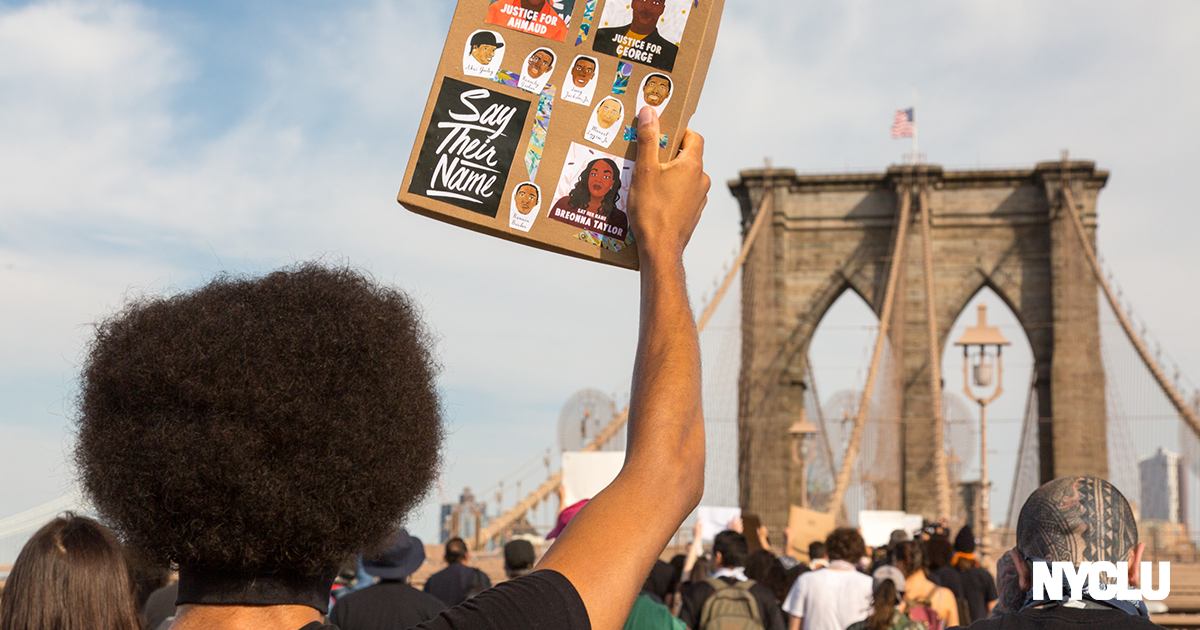What Could Defunding the Police Look Like?

The police killings of George Floyd and Daniel Prude, and the police shooting of Jacob Blake, have prompted calls to defund the police. But what does it mean to defund the police and radically transform what community safety looks like? And how can we get there?
The NYCLU is one organization among many grappling with these questions.
First, it’s important to understand the history of policing in the United States.
Starting with the slave patrols created to maintain slavery, to police officers participating in or condoning lynching, to officers enforcing Jim Crow-era prohibitions, law enforcement has been given power and taxpayer monies to exert control over Black and Brown people and uphold white supremacy and privilege.
Police have served as the vehicle to suppress social movements—breaking up labor strikes and picket lines, attacking protest demonstrations, and engaging in massive surveillance of those who criticize the government. This has come at an unacceptable price to Black and Brown communities, who have systematically and relentlessly experienced violent and racist policing.
History has also taught us that attempted reforms have not changed the fundamental structure and nature of policing in this country, and they’ve sometimes helped to increase police budgets. Instead of overfunding police departments, we need to plow resources into things like quality education, infrastructure and transportation, and health care. These are services that have been dramatically underfunded in our country and our state as police budgets continue to grow.
We must work to defund, disempower, transform, and ultimately abolish policing as it exists now because it is impossible to separate policing from its roots in white supremacy and racial control. Defunding police does not mean people can commit crimes and endanger others without consequences. Defunding police means police officers should no longer be the default solution to health needs, housing and food insecurity, and inequities in education and employment. It means disrupting the cycle of surveillance, fear, punishment, and criminalization, and investing in systems that truly protect communities and help people thrive.
We must defund policing and redirect those funds to enable Black and Brown people to develop and implement new models of promoting community safety, health, and well-being. Defunding police and re-envisioning community safety involves the following:
Dispel the “bad apples” myth.
The history of state-sanctioned police violence and racism is not just the work of a few bad actors. It’s the product of the historical power structure and culture of policing. Abusive policing and excessive force against Black and Brown people are not exceptions to the norm—they are the norm.
Invest in communities.
While police budgets have climbed, money for education, physical and mental health care, housing, and other services have stagnated or disappeared.
We must defund the police and invest those funds in trained, unarmed professionals and services that can directly meet the needs of underserved communities and promote community safety and well-being at its roots. This includes fully investing in – among other things – free education, free or at least affordable physical and mental health care, affordable housing, infrastructure and public transportation, youth programs, elder services, and assistance for disabled people.
Limit contact with police.
A key way to reduce police violence and racism perpetuated against Black and Brown communities is to reduce contact between the public and police. To do that, we must shrink the size and power of the police force and re-assign responsibilities for social interventions away from police.
We must understand that police officers are not the solution to the challenges that our communities face. Instead, we need non-law enforcement first responders with training and expertise, not officers with guns. That means culturally competent clinicians with lived experiences respond to people in mental health crises, trained counselors intervene in domestic violence situations, and drug treatment specialists support those with substance abuse problems. We must be intentional about not recreating the system of policing in other sectors.
And we must continue to fight programs and policies that increase public contact with the police, including mass surveillance, stop-and-frisk, and the enforcement of low-level offenses.
Demilitarize the police and end mass surveillance.
We must ban the use of military-grade armaments that police use to terrorize communities, including tear gas, pepper spray bullets, long-range acoustic devices, grenade launchers, mine-resistant tanks, and bayonets. We must end state and federal grant programs that provide this equipment.
Police must also stop using surveillance devices and programs to intimidate and violate the privacy of Black and Brown communities.
Flood schools with counselors, not cops.
There are thousands of police in schools across the country. This results in the arrest of countless students for minor misbehavior.
We must work towards a future where students are safe in school, educators are trained not to rely on police for conflict resolution, and there are no police in schools at all. We must remove police officers and other surveillance devices from schools, and replace them with the needed number of teachers and counselors.
Put Black and Brown communities in charge.
Black and Brown communities looking to defund the police and invest in their communities must be in equal partnership with the government in figuring out what services should be invested in. They should also be the leading voice when deciding what public safety models will work best.
The work of radically reimagining police and defunding incredibly powerful and deeply entrenched police departments will not be easy. But these principles can help guide us as we move, as quickly as possible, towards this future.
